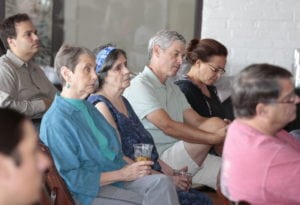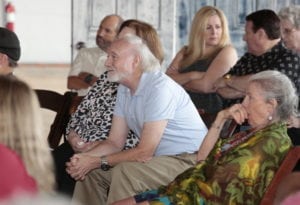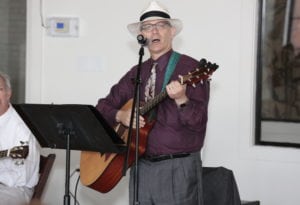To hear Liel Leibovitz tell it, poet, singer and songwriter Leonard Cohen is a prophet who spent his whole life seeking answers. Leibovitz shared his understanding of Cohen’s lifelong quest as well as his own story of how he came to be Cohen’s biographer at The J Arts & Ideas event, A Broken Hallelujah, The Life and Music of Leonard Cohen, held Sunday, September 18, at The Pointe.
Cantor David Lipp started the program with a four-song Leonard Cohen set that included “Bird on the Wire,” “Story of Isaac,” “Who by Fire” and “If It Be Your Will.” He accompanied himself on guitar and was joined by the Pat Lentz Trio with Hunt Butler on flute and saxophone, Jimmy Brown on bass and Pat Lentz on guitar.
Cantor Lipp observed that he chose these Cohen songs when the program was first scheduled last March, and now, with the High Holy Days just around the corner, they seem even more apt.
Leibovitz is an Israeli born to a well-to-do family in Hertzlya. When he was just 13, Leibovitz explained, his father, who was then 35, was told by his parents that it was time to get a job. The job he chose was robbing banks. He was successful in his career, robbing 21 banks before he was arrested two years later.
The then 15 year old, didn’t know how to deal with this and explained neither did anyone else. Family friends treated the family as if they were in mourning, bringing lots of food and offering emotional support.
Leibovitz’s friends chose to show their support by preparing a song mix tape for him that included some of Cohen’s work, “and my life was changed forever,” he explained. While his English skills were not sufficient to enable him to understand every word, the young Leibovitz found that “his voice conveyed that he told the truth.”
As an adult, when Leibovitz decided he wanted to write something significant, a book about Leonard Cohen was the logical choice. Yet his approach was unorthodox. Fearing that he would become star-struck, Leibovitz contacted Cohen’s manager and rather than asking to meet his idol, he requested access to Cohen’s archives. Cohen obliged and sent boxes containing more than 11,000 pages, enough to fill a significant portion of Leibovitz’s small Manhattan apartment.
In going through the materials, Leibovitz found his admiration of Cohen grew.
Cohen lost his father at an early age and his grandparents played significant roles in his upbringing. His mother’s father, a revered rabbi would read to him from the prophets in the Bible. His father’s parents were wealthy but more secular. They helped build a synagogue in Montreal and purchased land in Palestine.
Cohen, struggling to bring together the sacred and profane, turned to poetry and was successful at making a living from his work. Success was not enough for him because he felt he was juggling words to create lovely pieces but not changing hearts.
Next Cohen turned to writing novels. Once again, he was a success, and once again Cohen felt unfulfilled. Music was his third venture and still he kept searching.
Leibovitz explained that Cohen’s success in music was more limited because it came out in the wrong place and the wrong time; however, more recently the artist has enjoyed a resurgence as more people today understand his quest.
Cantor Lipp and his entourage closed out the program singing Cohen’s “Hallelujah” and its final words, “I’ll stand before the Lord of Song, With nothing on my tongue but Hallelujah.”
Copies of Leibovitz’s book were available for purchase and the author signed them.
This event was made possible by a grant from the Jewish Heritage Fund for Excellence.
The J wants to hear from you about what you’d like to see in future J Arts & Ideas programs. A J Arts & ideas Focus Group meeting will be held on Sunday, October 9, at 11 a.m. at The J. For more information, contact Young Adult Director Benji Berlow, 502-238-2715 or bberlow@jewishlouisville.org.






